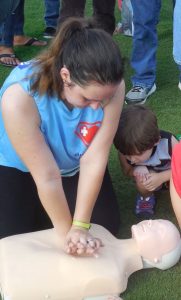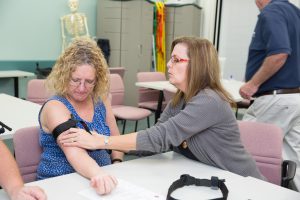 10 years Running, Event Offers Free CPR, Stop the Bleed Training and Family Fun
10 years Running, Event Offers Free CPR, Stop the Bleed Training and Family Fun
Would you know what to do if someone had a cardiac arrest in your presence – or suffered a severe, life-threatening wound?
The best hope for survival in either situation rests on the shoulders of the people who are right there, said David Schmitt, manager of Health First’s Training Center in Melbourne. That’s why Health First is hosting “Save a Life” Day Saturday, March 3 at the Melbourne Auditorium, 625 E. Hibiscus Blvd., marking a decade of providing free lifesaving training to the community. Participants will learn how to administer CPR, as well as bleeding-control tactics through Stop the Bleed training.
“The only thing more tragic than the death of a person is a death that was preventable,” Schmitt said. “Our goal at Health First is zero percent preventable deaths.”
The event, which is at no cost to the community, has helped train more than 20,000 people in CPR in years past. Added into the mix this year is Stop the Bleed, which has been taught to about 3,100 first responders and 1,275 civilians since being rolled out during the past five years.
The event’s schedule is as follows:
- 8 a.m. – Field day activities outside the auditorium, including a Health First Pro-Health & Fitness obstacle course, climbing wall, Zumba and cardio combat, and a ninja warrior children’s obstacle course. There will be prizes for the kids, face painting, a photo booth and an exhibit by the Brevard Zoo. A light breakfast will also be provided.
- 9 a.m. – Stop the Bleed training, inside the auditorium. The first 100 participants will receive free tourniquets.
- 10 a.m. – CPR training, inside the auditorium
Registration is required for both training sessions, which will be led by Health First instructors and volunteers. Participants who complete the training will receive a free T-shirt and a Pizza Gallery coupon.
Officials note acquiring such knowledge could be the deciding factor whether someone survives a critical medical crisis.
“By providing members of our community with free CPR, AED use and Stop The Bleed training, we make the Space Coast a safer place to live, work, play and visit,” Schmitt said.
According to Schmitt, nearly 90 percent of people who suffer out-of-hospital cardiac arrests die from them; if CPR is performed in the first few minutes, that person’s chance of survival can triple.
Stop the Bleed training (also known as B-Con) follows a national initiative, teaching bystanders how to quickly control bleeding in the aftermath of a traumatic event. Participants are taught how to save lives by applying pressure, as well as instructions on how to use a tourniquet.
Whether a gunshot wound or deep cut, serious, life-threatening arterial bleeding is the Number One cause of preventable death when it comes to trauma, Schmitt said. Those first few minutes post-injury – when emergency medical personnel are en route – are crucial and could determine whether a trauma victim survives or dies.
“Controlling the bleeding saves lives,” Schmitt said. “The best hope for survival is controlling the bleeding as close to the time of injury as possible. We must be able to treat ourselves, family, friends and others until professional help arrives.”
